Category: cuts
May 11, 2017 / 5 Comments
It Cuts! It Edits!
It slices! It dices! It makes julienne fries! Plus, just add salt, pop the tray into the oven, and look—perfect hash browns, a great addition to any breakfast!
Okay, I may have watched too many infomercials lately. There’s been a channel issue with the television. Don’t judge me.
Over the past few months I’ve talked with a few folks about editing. They’re almost always interesting conversations, but I noticed a while back they tend to skew in random directions. Well, not really random. The questions cover a large range.
One thing that catches some folks off guard is that there are different kinds of editing. They think of it as a general term, but it’s more of an umbrella that covers a lot of things. Like how an oil change, brake work, and a car wash can all fall under “basic maintenance,” even though I’d probably have different people do them—and may even do some of them myself.
 For example, I have a regular editor I work with, Julian, and he helps me edit my story. We dig through and find weak motivations, unclear dialogue, and the thing that doesn’t really match, tone-wise,for one reason or another. His edits help improve the story. When someone panics about “an editor making them change their story,” this is usually what they’re talking about.
For example, I have a regular editor I work with, Julian, and he helps me edit my story. We dig through and find weak motivations, unclear dialogue, and the thing that doesn’t really match, tone-wise,for one reason or another. His edits help improve the story. When someone panics about “an editor making them change their story,” this is usually what they’re talking about.
For the record, in almost ten years of doing this writing thing, and personally knowing close to a hundred professional writers with careers spanning most of that time, I’ve only ever heard of this happening once. One time where the editor insisted on a major change that the author disagreed with. And, no, it didn’t involve me or my editor.
I also work with a copyeditor. This is the person who finds spelling and grammar mistakes, inconsistencies that have slipped past everyone, and in some cases even a bit of fact-checking. The copyeditor help me improve the manuscript.
And of course, neither of these are like the edits that I do myself before the manuscript goes to my editor. Or even my beta readers. That’s when I’m trimming words, tightening the story, and trying to smooth out rough spots.
Today I wanted to babble on (probably too much) about those easy edits. The type of stuff that we all let slip though while we’re writing (and the experienced folks know to then get rid of in their first round of revisions). I’ve mentioned some of them before in a broad strokes sort of way, but it struck me that maybe I could even boil this down further.
So here are some words and phrases I can cut from my manuscript. Not all the time, but a fair amount of it. A lot of them lead to other words, too—they’re indicating a larger problem—so once I get rid of these it’ll probably mean a few others on either side go away, too. Which means I’ll end up with a leaner, stronger story.
One proviso before we dive in. When I’m talking about these cuts, I’m talking about prose, not dialogue. Dialogue gets a pass on a lot of this, because people have lots of odd tics and habits when they talk, and all my characters are people, right? Don’t worry about these suggested cuts too much, except maybe where they overlap with basic dialogue tips.
This would apply to first person stories, too. They’re effectively dialogue—stories being told in a strong, specific character voice. Just remember, characters and artful dialogue are fantastic, but it all needs to serve the story. I don’t want my narration to collapse because of an all-too realistic narrator.
Okay, so… Ready?
Adverbs— As mentioned above, most of us get caught up in the flow of words, and what usually slips in is adverbs. We try to pretend they’re important—they spent valuable school-hours on them, after all, and school would never waste our time—but the sad truth is they can almost always be replaced. I’d guess that three out of five times if I’m using an adverb, I just don’t need it. The fourth time odds are I’m probably using the wrong verb, and once I find the right one, again, I won’t need the adverb. If I’m using my vocabulary well, there aren’t many times I need one.
While I was editing Paradox Bound I cut around 170 adverbs and adverbial phrases in my first editing pass. That’s almost a solid page of adverbs, gone. Search your manuscript for LY and see how many you find.
 Adjectives—Some folks use a lot of adjectives to make normal, average things sound interesting. Coincidentally, these folks tend to have a poor vocabulary. So when I don’t know multiple words for, say, sword, I’ll just use multiple adjectives instead of blade, claymore, rapier, saber, foil, or falchion.
Adjectives—Some folks use a lot of adjectives to make normal, average things sound interesting. Coincidentally, these folks tend to have a poor vocabulary. So when I don’t know multiple words for, say, sword, I’ll just use multiple adjectives instead of blade, claymore, rapier, saber, foil, or falchion. Of course, we all go a little overboard now and then (anyone who says they don’t is lying to you) because we’re convinced this person, this place, this thing needs extra description. Yet we all know too much description brings things too a grinding halt.
There’s an odd habit I’ve seen among fantasy writers—not only them, and not all of them by a long shot, but enough to make it worth mentioning. They use dozens of adjectives per page, if not per sentence. Often redundant ones like “gleaming chrome sword of pure silver.”
I was at a writing conference a few years back where writer/ editor Pat LaBrutto tossed put a pretty solid rule of thumb. One adverb per page, four adjectives per page. It’s only a guideline, yeah, but if I’m averaging fifteen to twenty adjectives per page… maybe I should give them all a second look.
That—People tend to drop that into their writing a lot, and a good three out of four times their writing would be tighter without it. I used to be a that junkie until someone pointed out how unnecessary it often is. Look at these sentences—it doesn’t add anything to them.
Phoebe could see that the two of them were meant to be together.
He punched her in the same arm that she had been shot in.
She knew that the Terminator would not stop—ever—until it had killed her.
Use the Find feature, search for uses of thatin your writing, and see how many of them are necessary. Odds are you’ll find more than half of them aren’t. I cut 132 that‘s from Paradox Bound—just over half a page.
(I’ve gotten better about adding them in to start with…)
Useless Modifiers — I’ve called this Somewhat Syndrome a few times in the past. This is another one I wrestle with a lot, although I like to tell myself I’ve gotten better about it. It’s when I pepper my writing with somewhat.., sort of…, a bit…, kind of…, and other such modifiers. I’d guess nine times out of ten they’re not doing anything except adding to my word count (not in the good way) and slowing my story (also not in the good way). Use the Find feature again and see how much tighter and stronger your story is without these.
I cut over two hundred of these from that first draft of Paradox Bound. That’s another full page gone.
Decided—This word’s almost always filler. Maybe not conscious filler, but it’s almost always filler that can be cut. If Wakko decides to do somethingand then he does it, I’m just eating up words again. We all make hundreds of decisions and choices every day, but readers want to hear about the action, not the decision to take an action. The action itself implies the decision was made.
Listen/ Look—If I start a line of dialogue with look or listenI’d bet that almost 80% of the time it’s either an infodump or it’s stating something plainly apparent. Which means this dialogue is adding something that could be expressed through actions or subtext or any number of ways. Or it isn’t adding anything.
Obvious—If something isn’t obvious, it comes across as arrogant to say it is. So I shouldn’t use the word obvious, because the character (or writer) in question is going to look like a jerk. Which, granted, might be the point…
On the flipside, if something is obvious, then I still don’t need the word. Things that are obvious are… well, obvious, so it’s just wasted words for me to tell the readers about it.
 Seemed/Appeared/ Looked – I’ve talked about these words a few times before. They show up in phrases like “appeared to be,” “seemed to be,” “looked like,” and so on. The catch is, seemed to be and its siblings don’t get used alone. They’re part of a literary construction where the second half of that structure is either an implied or actual contradiction to the appearance. So when I’m saying “Yakko seemed like the kind of man you didn’t want to mess with,” what I’m really saying is “Yakko seemed like the kind of man you didn’t want to mess with but really he was a pushover who fainted at the sight of blood.” And what I meant to say all along was just “Yakko was the kind of man you didn’t want to mess with.”
Seemed/Appeared/ Looked – I’ve talked about these words a few times before. They show up in phrases like “appeared to be,” “seemed to be,” “looked like,” and so on. The catch is, seemed to be and its siblings don’t get used alone. They’re part of a literary construction where the second half of that structure is either an implied or actual contradiction to the appearance. So when I’m saying “Yakko seemed like the kind of man you didn’t want to mess with,” what I’m really saying is “Yakko seemed like the kind of man you didn’t want to mess with but really he was a pushover who fainted at the sight of blood.” And what I meant to say all along was just “Yakko was the kind of man you didn’t want to mess with.” If I’m not trying to establish a contradiction, using appeared to be and the others isn’t just wasted words– it’s wrong. So cut them
As you know—I’ve talked about these three words a few times before. They’re awful. Just awful. I won’t say this is the worst way to get the facts out to my readers—I have full confidence there’s someone out there now working on a worse way—but I’d put this in the 99-out-of-100 category.
If I’m saying “as you know” to you, it means you already know what I’m telling you… so why am I saying it? Why waste words blatantly stating something that you and I both know? Yeah, maybe you’ve got amnesia, but if you do then you don’t know… so why am I saying “as you know” to you?
If these three words pop up together more than once in my manuscript, odds are I’m doing something horribly wrong.
Was– I always search for was, because it tends to point at weak verb structures. It’s when I’ve got “Phoebe was running” instead of just “Phoebe ran.” It’s a small tweak, but it’s one that gives my writing punch because it makes all my actions read just a bit faster.
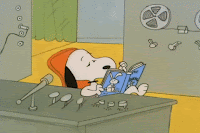 The Word—This is a tough one, because it’s going to depend on experience and spending time going through my manuscript. I’ve found that a lot of times I’ll inadvertently reuse a word or simple phrase again and again and again. It’s not really that odd—in the rush to get that first draft out, there are a lot of places I’m going to pick the first word that comes to mind. Might be a certain verb, might be a noun, might be an adjective. In Paradox Bound it was glared. Lots of people glared in the early drafts of that book. At each other. At objects. Out at the uncaring universe…
The Word—This is a tough one, because it’s going to depend on experience and spending time going through my manuscript. I’ve found that a lot of times I’ll inadvertently reuse a word or simple phrase again and again and again. It’s not really that odd—in the rush to get that first draft out, there are a lot of places I’m going to pick the first word that comes to mind. Might be a certain verb, might be a noun, might be an adjective. In Paradox Bound it was glared. Lots of people glared in the early drafts of that book. At each other. At objects. Out at the uncaring universe… Keep an eye out for your word.
And there’s eleven things I always search for and slice away. Editing made simple. Well, some of the editing.
One type of editing.
And this was so much longer than I’d planned. So sorry.
By the way, if you’re in the SoCal area, this Sunday is the Writers Coffeehouse. We’ll be meeting noon to 3:00 at our usual hangout, Dark Delicacies in Burbank. Swing by, hang out and join us as we talk (this month) about creating great characters. Or just lurk.
Next time… I had a few thoughts about genre and devices and structures you might find kind of interesting.
Until then, go write.
June 30, 2016
Better Writing Through Editing
Three weeks until San Diego ComicCon!
As it happens. I’m actually a bit bogged down right now, trying to get everything set up for SDCC while also doing a ton of edits (and also trying to deal with a killer headache). To be honest, I was half-thinking of skipping this week.
Fortunately for all of us, Timothy Johnson stepped up and offered to scribble out some quick thoughts on editing as a tool for improving our writing. Tim’s an editor based out of Washington, D.C., and he’s got a debut sci-fi/horror novel, Carrier, available right now from Permuted Press (go check it out). All things said, he has a pretty good idea what he’s talking about. You can find him regularly on Twitter or Facebook.
Next week, I’ll be back to talk about sorting through feedback. For now, here’s Tim…
——————-
This post is not about commas. It’s not about mechanics or style. It’s not about verb conjugation or misplaced modifiers.
I know many writers bemoan the editing process. I get it. It can seem unnecessary and even like a waste of time. But I promise you it’s not. Even though you wrote your story, it’s still a crudely formed lump of clay.
So, I’m not going to get into the nuts and bolts of grammar. This post is about helping you, a writer, become better at writing. Through editing, you can take your writing to the next level. It’s about how you take the word stream of your writing process and turn it into a cyclical filtration system for distilling tight, compelling prose.
It’s basically how to become a Brita filter for literature.
If you came in here thinking, “Ugh, I don’t want to learn stuff. This is why I pay an editor to make my writing good,” stick around. As an editor, I can assure you I’m human, and that’s relevant because there’s a quality quotient that we can achieve based upon the work you present to us. That is to say, if you serve us crap, we might be able to make a crap casserole, but it’s still a crap casserole. Give us better ingredients to work with, and the end result will be better for it.
So pick up your hammer and chisel, and let’s get to work.
Find your brain stutters.
If you’re human, you probably say, “um,” more than any other word in a typical day. We say, “um,” when our brains search for the right word but our mouths want to keep going. Similarly, we have the same disconnect between our brains and our fingers, those overzealous bastards.
“That” is simple. It’s the most overused word in the English language. If you see “that” in your writing, chances are it’s unnecessary and you can destroy it with zero regret.
“This/these/those” are a little different. We often use “this/these/those” as demonstrative pronouns. That’s basically fancy grammar talk for “you know what I’m talking about, shut up.” And they’re perfectly acceptable, grammatically speaking. The problem is they’re vague, and if our objective is to get our language tight and compelling, they aren’t going to do the job.
Find these (see what I did there?) and destroy them. Ask yourself what you’re actually writing about, and use a noun.
Another stutter to look out for is passive voice. For many people, it can be difficult to recognize, and some will even argue it’s not that big of a deal. Well, to those people, I say it’s super popular in legal speak for a reason: passive voice is unclear and confusing.
We often write passive voice because we have action-oriented minds. We consider more strongly the thing that is happening than the people who are performing the action. You get a pass as a human, but as a fiction writer, you don’t get to rest on your laurels. Writing active sentences will serve you better.
To find your passive sentences, look for statements in which it isn’t clear who or what the subject is. Most times, you can find passive voice by looking for any form of the verb “be.”
Let’s write a stupendously ridiculous example that combines all three of these brain stutters:
“This is something that you are wanted to do.”
Now, if we unsuck that, it becomes the following:
“I want you to kill him.”
See how this edited version is way more direct, clear, and powerful? If this stuff is a bit too abstract for you, let’s dial it back a bit.
Find your weak language.
Generally, people write how they speak. There’s nothing wrong with that, but one of the points of thinking about your own writing critically is to construct storytelling prose that isn’t boring, mundane, everyday language as if you’re telling someone a story in a grocery store checkout line.
You can certainly crank the wrench too far and edit the human quality out of your words, so the onus is on you to find a balance where your prose leaps off the page but still is identifiable as yours.
“To be” is the worst offender of being weak. I mean, “to be” is the worst offender of weak language. “To be” verbs can signify passive language (see above), but most often, they mark an opportunity to do something more interesting. Find all instances of “be/been,” “is/are,” and “was/were,” and see what else you can do with those sentences other than pointing out that the subjects of those sentences exist.
Beyond existential quandaries, however, authors tend to filter actions unnecessarily. For example, they may relate how the main character felt a bullet hit his arm, rather than writing, “The bullet tore through his arm.” Similarly, authors tend to explain how the main character watched as a comet flew through the atmosphere instead of writing, “The comet blazed across the night sky.”
Unless your point is the character’s internal experience with these happenings, you are creating a buffer zone between me and the visceral experience. This is akin to pulling your punches in boxing. Are you trying to lose the fight for your reader’s attention? Find all instances of “feel/felt” and “watch/watched/see/saw.” Chances are, you can hack the first part of the sentence off, and nobody will miss it.
Moving on, Stephen King wrote that the road to hell is paved in adverbs. He then continued to use adverbs, but I digress. What are adverbs? They are essentially any word that ends in “-ly.” So, “happily,” “dangerously,” “doggedly,” “grimly,” and on and on. You get the idea. These words are useful, but they signal a weak verb. Like adjectives, which modify nouns, adverbs modify verbs; however, unlike nouns, verbs have the power to imply additional information. In other words, we don’t need no stinkin’ adverbs.
Find them and destroy them. While you’re at it, take care of “very,” “almost,” “about,” and the like. They indicate inexact language and have no place in tight, powerful fiction. If we don’t get the idea from the word you’re modifying, you’ve used the wrong word.
Let’s keep going. I’m good. You good? Good.
Gerunds. Gerunds are the verb form that ends in “-ing.” Generally, gerunds describe a process that is ongoing, and while there’s technically nothing wrong with them, many authors overuse them and use them incorrectly. Seek them out, and see if the regular form of the verb will suffice. For example, what’s the difference between, “The hobbits were dancing at the Prancing Pony,” and “The hobbits danced at the Prancing Pony”? Five letters and a space, and stronger prose.
As a final language-strengthening tip, look for repetitive words. It can be jarring to a reader to see the same word twice in a short amount of space, but also variety is the spice of life. If you find you’ve used the same word twice in the same paragraph (even the same page, if you want to be as anal as I am), it’s an opportunity to edit and make your writing more interesting. Seize that chance. Your readers won’t thank you, but that’s the point. They’ll never know your writing was worse. They’ll just be impressed at how good it is.
Oops! You learned something.
By employing these tips, I promise your work will read better. And, by editing your work, you will force yourself to think critically about your prose. You will slow yourself down, focusing on the small ideas instead of concerning yourself with the big ideas. The small ideas are extremely important, because only through those ideas do we, as readers, understand your big ideas.
If you keep at it, eventually, you will recognize these weaknesses while you write, and you will discover better versions of your sentences with progressively less effort. It will become automatic and ingrained in your writing. By using these techniques to improve the writing you’ve already done, you will improve your future writing before you write it. More important, you’ll look back and realize that, on a fundamental level, you’ve become a better writer.
February 7, 2014 / 2 Comments
The Death of a Dozen Cuts
I almost went with “Cheaper By The Dozen” for the title, but I figured there was no reason to make you all remember that little piece of pop culture.
I’ve been watching people talk about editing lately in a few different online groups. More to the point, about the need for more of it in certain corners of the industry. A side-thread in one of those conversations was about one fellow determined to get his book edited by Thursday so he could get it up on Amazon by Friday.
Anyway, that got me thinking about easy edits. The type of stuff that we all let slip though while we’re writing and the experienced folks know to then get rid of in their first round of revisions. I’ve mentioned some of them before in a broad strokes sort of way, but it struck me that maybe I could even boil this down further.
So here are a dozen specific words I can cut from my manuscript. Not all the time, but a fair amount of it. A lot of them lead to other words, too—they’re indicating a larger problem—so once I get rid of these it’ll probably mean a few words on either side of them go away, too. Which means I’ll end up with a leaner, stronger story.
Yes, you’ve probably seen me mention lots of these before. I even linked to some of the other posts in case anyone might want more explanation.
Yes, you’ve probably seen me mention lots of these before. I even linked to some of the other posts in case anyone might want more explanation.
Ready?
That—I’ve mentioned that a few times here, so I won’t bore you by explaining it yet again. Needless to say, I always do a thatpass while I’m editing and end up removing about 80-90% of them. While I was revising Ex-Purgatory, I cut over 130 thats—more than half a page of them!
Decided—This word is almost always filler. Maybe not conscious filler, but it’s almost always filler that can be cut. If Yakko decides to do something and then he does it, I’m just eating up words again. We all make hundreds of decisions and choices every day, but most readers want to hear about the action, not the decision to take an action. The action itself implies the decision was made.
Listen/ Look—If I start a line of dialogue with look or listen, I’d bet that three out of four times that line either states something plainly apparent or it’s an infodump. Which means either these lines aren’t adding anything to the story or they’re adding something I could express better through subtext or actions.
Obvious—If something isn’t obvious, it comes across as arrogant to say it is. So I shouldn’t use the word obvious, because the character (or writer) in question is going to look like a jerk.
On the flipside, if something is obvious, they I still don’t need the word. Things that are obvious are… well, obvious, so it’s just wasted words for a writer to tell us so.
Appeared/ Seemed/Looked – These three words show up in phrases like “appeared to be” or “seemed to be” or “looked like.” Not always, but quite often. The thing is, appeared to be and its siblings don’t get used alone. They’re part of a literary construction where the second half of that structure is either an implied or actual contradiction to the appearance. So when I’m saying “Yakko seemed like the kind of man you didn’t want to mess with,” what I’m really saying is “Yakko seemed like the kind of man you didn’t want to mess with but really he was a pushover who fainted at the sight of blood.” And what I meant to say all along was just “Yakko was the kind of man you didn’t want to mess with.”
If I’m not trying to establish a contradiction, using appeared to be and the others isn’t just wasted words– it’s wrong. So cut them
Was – I always search for was, because it tends to point at weak verb structures. It’s when I’ve got “Wakko was running” instead of just “Wakko ran.” It’s a small tweak, but it’s one that gives my writing punch because it makes all my actions read just a bit faster.
Also, this can save me from the awkward problem of simultaneous actions, when my chosen verb form ends up creating a chain of things happening at the same time rather than a sequence of events.
As you know—I’ve talked about these three words a few times before. They’re awful. Just awful. I won’t say this is the worst way to get the facts out to my readers—I have full confidence there’s a writer out there now working on a worse way—but I’d put this in the 99-out-of-100 category.
If I’m saying “as you know” to you, it means you already know what I’m telling you… so why am I saying it? Why waste words blatantly lecturing about something that you and I both know? Yeah, you might have amnesia, but if you do then you don’t know… so why am I saying “as you know” to you?
If these three words pop up together more than once in my manuscript, odds are I’m doing something horribly wrong.
And there you have it. A dozen words you can search for and slice away. Editing made simple. Well, some of the editing. I didn’t even mention my more common somewhat syndrome words.
Next time, it’ll almost be Valentine’s Day, so I guess I should talk about love and all that stuff.
Until then, go write.


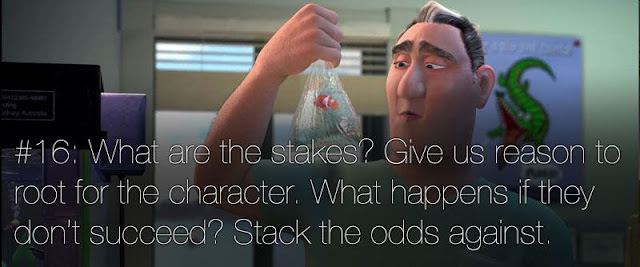
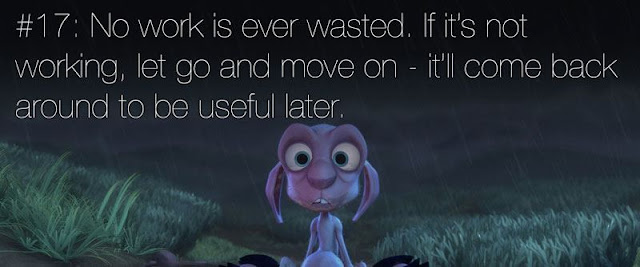
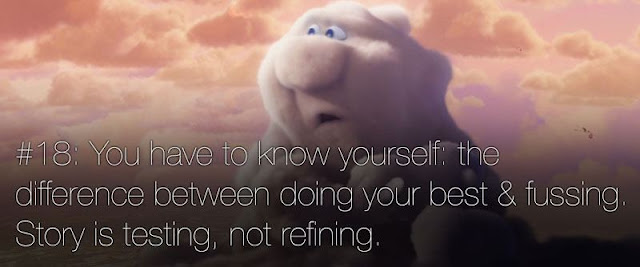
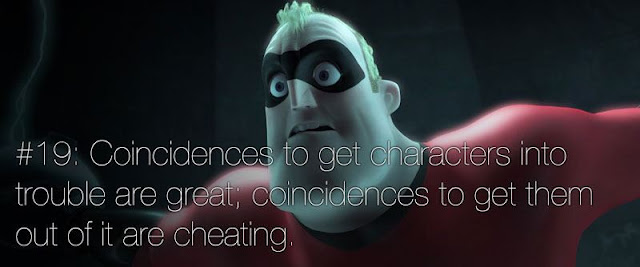

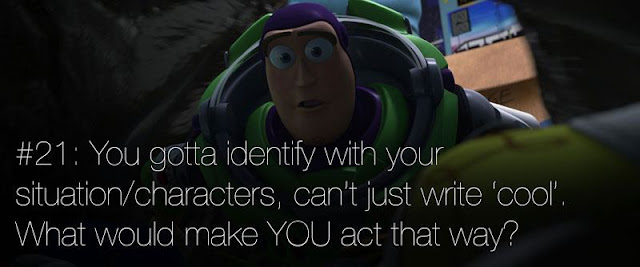
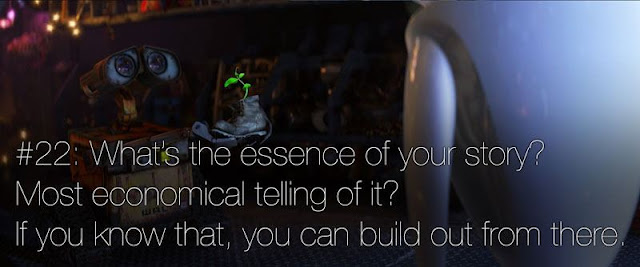




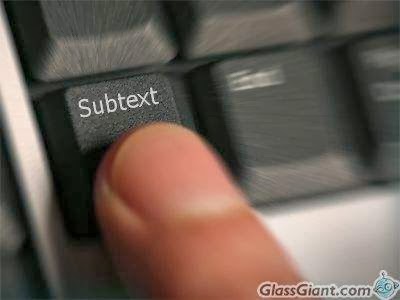
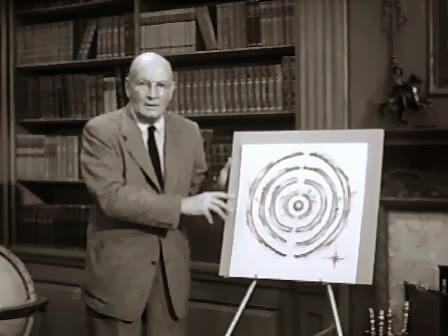.jpg)